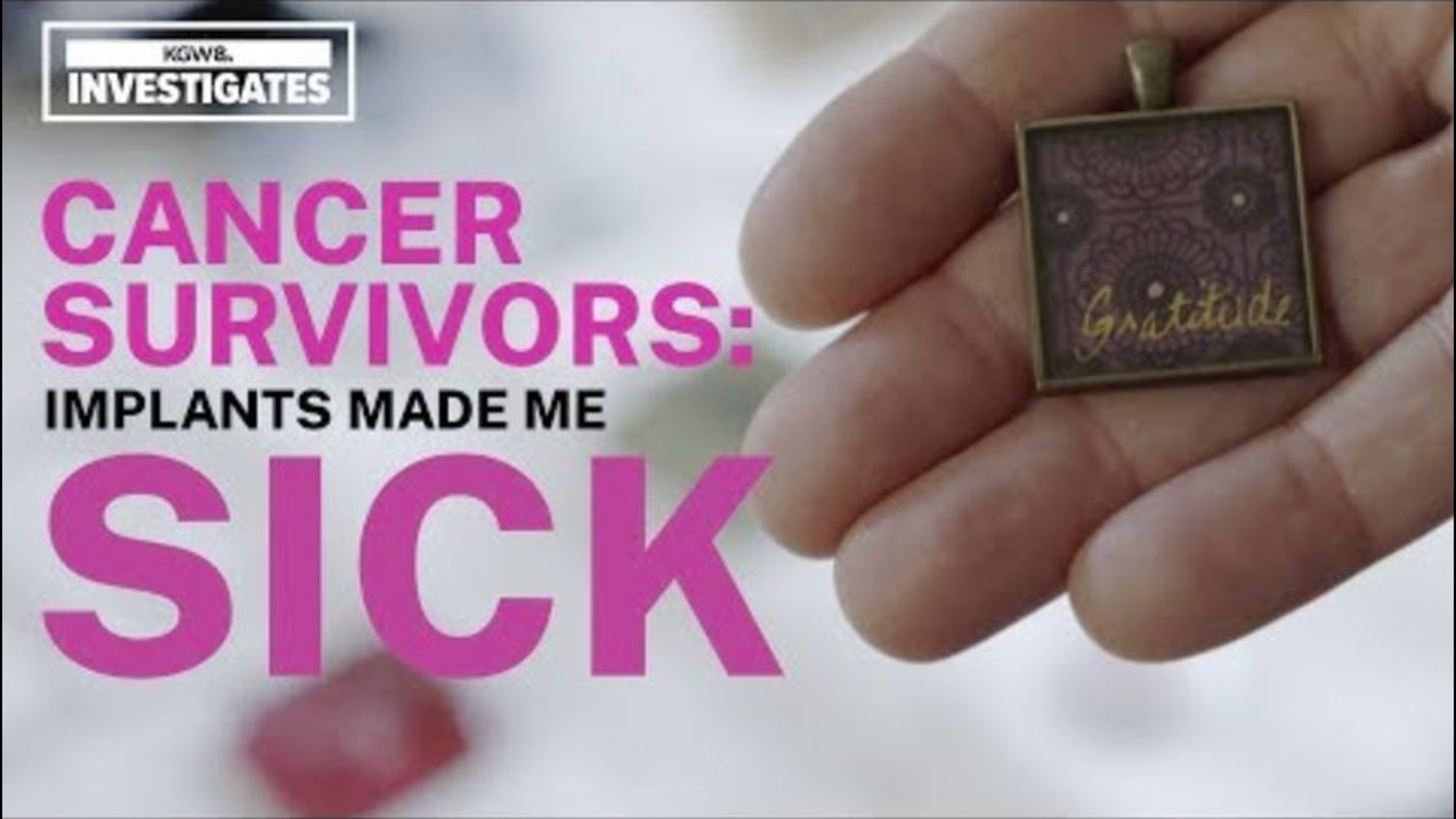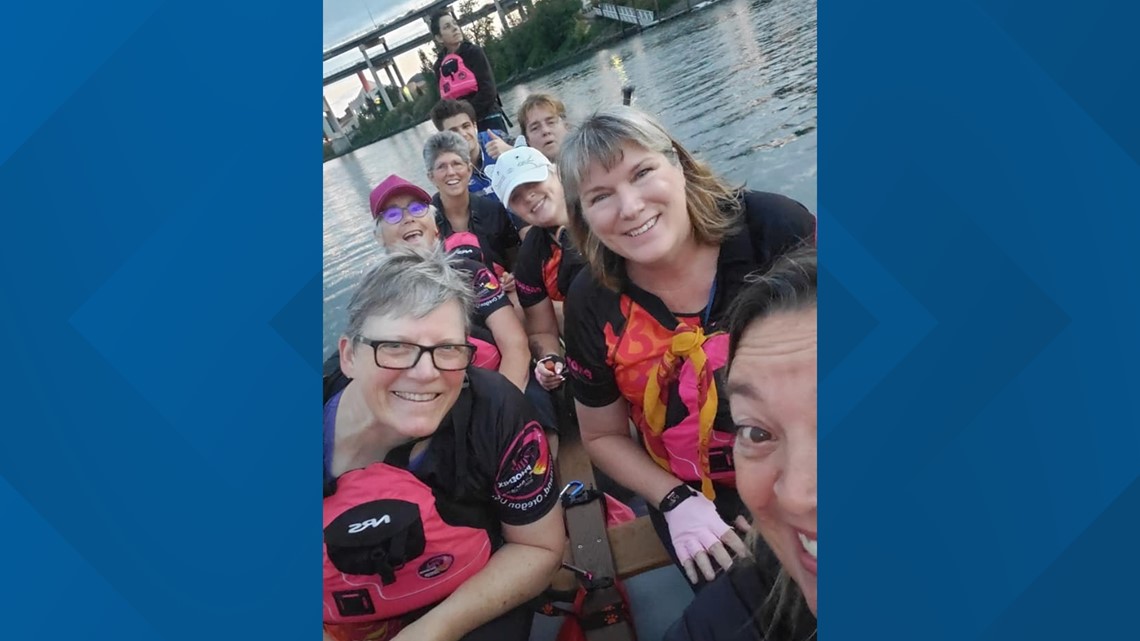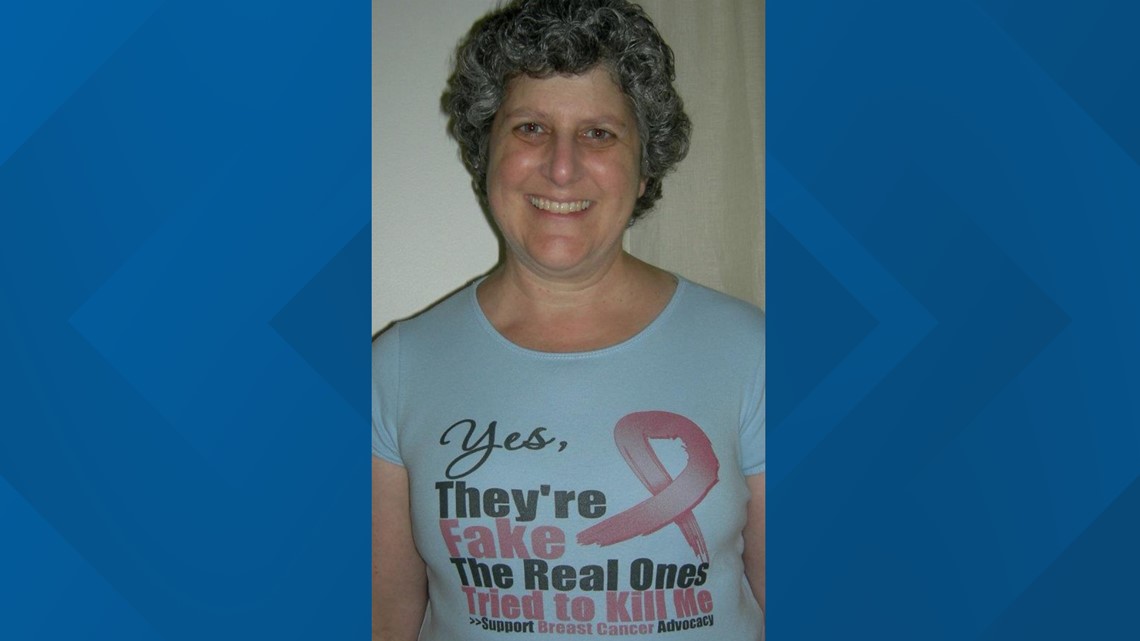Cancer survivors say breast implants are making them sick; linked to rare cancer
Delo Fercho and Sarah Case are survivors. They beat breast cancer and got implants following their treatment. Now, they are choosing to have their implants removed.

Delo's Diagnosis
Delo Fercho was diagnosed with breast cancer three years ago.
“And what was really crazy about that is because everybody in my family who had breast cancer had died,” said Fercho.
Fercho, who had a double mastectomy as part of her treatment, decided to get breast implants.
According to the American Society of Plastic Surgeons, breast augmentation is the most popular surgery in the United State with more than 300,000 procedures done in 2018.
“Because, just like from what I've heard, that's how you feel like a woman again,” Fercho said about her decision.
Fercho had the surgeries, recovered without any problems and threw herself headfirst into new hobbies.
“I have a motorcycle and so I'd ride that to CrossFit. It felt really good to get off that, you know, like I'm all sporty and stuff, even with my implants,” said Fercho."
She got a tattoo, a pink cancer ribbon with the phrase ‘thriving’ written on her forearm.
“It made me feel like I had control of my life, because I got diagnosed at 50 years old, so I figured it's time,” said Fercho.
Her favorite new hobby, by far, was rowing with Pink Phoenix a Portland dragon boat team made up of cancer survivors.


“I felt that I had come home to something like, like this was, this was going to be my life,” said Fercho.
Then earlier this year she started feeling pain in her legs and neck, she had brain fog and couldn’t swallow.
“Every time I tried to swallow it felt like my throat was going to close up and I felt like I was going to die,” said Fercho.
Her doctors and specialists couldn’t find the cause, her pain became worse and she was sidelined from all her new activities.
“I'm walking by and seeing my paddle and I can't use it, like, what has my life become? I woke up one night and I told Randy if this is going to be my life, I don't want it," said Fercho. "I actually said that to him. If this is going to be my life, then I don't want it anymore. That's how bad it was.”
Fercho started researching her symptoms and learned about breast implant illness or BII.
Thousands of women have complained to the FDA about chronic pain and autoimmune issues they say are caused by their implants.
According to the FDA’s website, Systemtic Symptoms or Breast Implant Illness is described as:
Symptoms such as fatigue, memory loss, rash, "brain fog," and joint pain may be associated with breast implants. Some patients may use the term "breast implant illness" (BII) to describe these symptoms. Researchers are investigating these symptoms to better understand their origins. These symptoms and what causes them are poorly understood. In some cases, the removal of breast implants without replacement is reported to reverse symptoms of breast implant illness.
Fercho found a Facebook group with more than 90,000 women experiencing similar autoimmune issues with their breast implants.
“I read that once they got, they call it explanting, once they got [their implants removed] that their symptoms improved, if not immediately, [then] within a few months afterward their symptoms were gone,” said Fercho.
Explanting is another way to describe implant removal surgery.
“There are a number of really nonspecific symptoms that can go along with breast implant illness, memory issues, kind of brain fog, neurologic issues, nerve-related pain, muscle aches, weakness, fatigue,” said Doctor Julianne Hansen, Chief of Plastic and Reconstructive Surgery and OHSU.
Dr. Hansen said more research is needed on BII but some women feel their only option is to get their implants removed.
“When women have tried everything and they’re desperate, of course, I think plastic surgeons should be open to the possibility that their implants may be implicated. So, for me personally as a plastic surgeon, I will always work with those patients, counsel them appropriately, and be willing to take their implants and the capsules out if that’s what we decide to do,” said Dr. Hansen.
Data from the American Society of Plastic Surgeons shows nearly 28,000 women had their implants removed last year, a 38% increase compared to ten years ago.
That’s what Fercho decided to do this past summer, our interview was two weeks after her explant surgery.
“As a matter of fact, I feel better having them gone. Cause then I feel like I'm me and I don't have to be ashamed of being me.”
A month later, Fercho was back at dragon boat practice.
“I’m feeling so much better. I’m exercising. I’m back on the boat. Being out and back on the team has breathed life into me again,” said Fercho.
Sarah's Story
Fercho had no idea, her teammate, Sarah Case, the woman sitting next to her on the boat the day KGW was filming, has her own breast implant issues.
Case was diagnosed with cancer nine years ago, got a double mastectomy and opted for breast implants.
“Cancer robs you of so many things, especially breast cancer. I just had this sense of wanting to get as much of my body back as I could, you know, kind of restore my original anatomy that I was gifted,” said Case.
After issues with her first breast implants, her doctors recommended replacing them with a textured implant.
She received a letter a few months ago that her textured implants made by Allergan were linked to a rare form of cancer.
In July, the FDA requested Allergan to pull its textured implant after it was tied to a rare form of lymphoma.
“I had a cancer humor tee shirt from the first reconstruction that said, 'Yes, they're fake. My real ones tried to kill me'. And I thought, well, I should really add onto that t-shirt now and say, and it turns out my fake ones are trying to kill me too now,” said Case.


The letter says the implants are being recalled but the cancer is so rare, patients don’t have to get them removed.
“You know, of course, my initial reaction is why should I trust these people? This is coming from the manufacturer,” said Case.
Case is getting her implants removed and opting for another procedure that uses skin flaps from other parts of your body to reconstruct breasts.
She hopes the silver lining in all this is that cancer survivors know breast implants aren’t their only option.
“My hope is that they will understand what their options are for reconstruction. Not only that they have a right to it, but that there are other options besides implants,” said Case.
Dr. Hansen said while the risk of getting that cancer is low, one in 3-thousand women, that’s still too high for some patients.
She said OHSU has contacted the nearly 200 patients with the textured implants to go over their options.
“It feels terrible, of course. No doctor wants to ever feel that they've done something to a patient that has resulted in a new disease process," said Dr. Hansen. "So the best thing we can do is gather information, present this information to our patients and, either prevent it from ever happening again in the future or be prepared to move forward with our patients to give them the choices for that optimal treatment moving forward.”
FDA takes action
The Food and Drug Administration now wants women getting breast implants to receive stronger warnings about the risks associated with implants.
The FDA said manufacturers should add a warning highlighted by a box, the FDA's most serious warning, to the information given to women considering implants.
The agency is also recommending patients complete a checklist to make sure they understand all the possible side effects of the implants including pain, rupture and a rare form of cancer.
The agency is accepting public comment until December of 2019.


